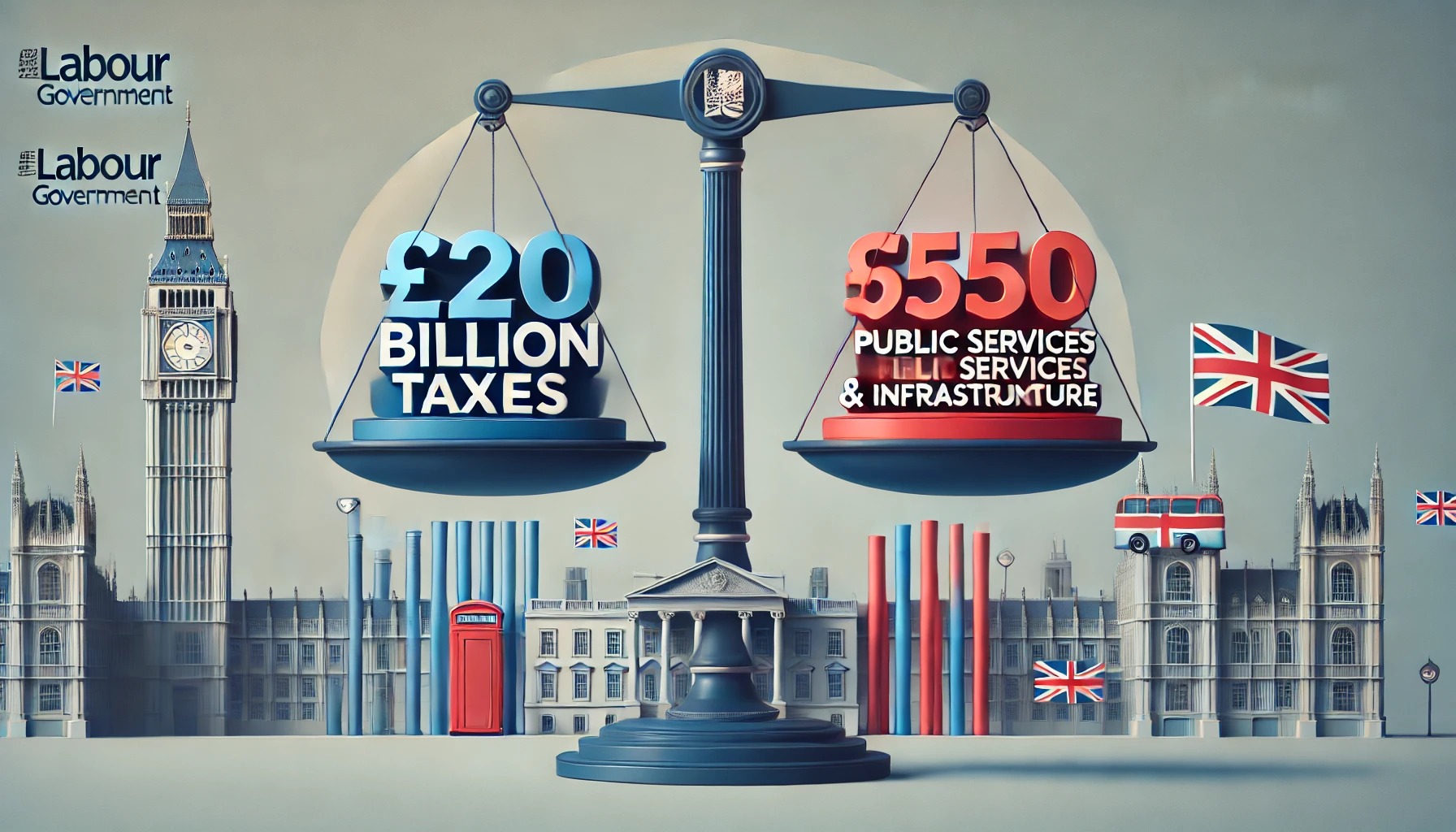As Britain's new Labour government prepares for its first budget on October 30, it may need to increase taxes by £20 billion ($26 billion) to prevent real-terms cuts in public services, according to a report by the Resolution Foundation. The think tank highlights the potential need for substantial tax hikes while also recommending new budget rules that could create room for significant long-term investments without breaching Labour's debt reduction promises.
Strategic Budget Shift for Long-Term Investment
The Resolution Foundation suggests that revising current budget rules to adopt an alternative measure of public debt could provide flexibility for Finance Minister Rachel Reeves to maintain her commitment to debt reduction. By adopting this new framework, Reeves would be able to support long-term investments, particularly in public services and infrastructure, which the country urgently needs.
James Smith, the think tank's research director, emphasized that "the budget should chart a new course for the Labour government, focused on large-scale capital investments backed by a new fiscal rule that considers both the benefits and the costs of those investments." He proposed that debt should be redefined in terms of public sector net worth, a broader measure that accounts for the value of public assets against historical borrowing. This approach could free up an additional £50 billion for investment.
Short-Term Costs vs. Long-Term Gains
While there may be initial concerns over tax increases and additional borrowing, Smith argued that the long-term benefits—such as revitalized public services, improved infrastructure, and stronger economic growth—far outweigh the short-term costs. He stated, "The short-term concern over tax hikes is understandable, but the long-term gain of restoring public services and boosting economic growth is what Britain needs right now."
Economic Outlook Amid Tax Hike Concerns
The UK's economic data showed modest growth in August, with output increasing by 0.2%, following two months of stagnation. However, business and consumer confidence surveys have indicated declining sentiment, largely driven by fears of upcoming tax increases. The prospect of a potential tax rise comes on the heels of the last Conservative government's budget, where the Institute for Fiscal Studies (IFS) estimated that taxes would need to rise by £25 billion to maintain public services.
Rachel Reeves has also acknowledged the £22 billion gap in public finances left by the previous government. She has warned that while some taxes will need to increase, Labour will uphold its promise not to raise taxes on "working people." This means the government will not increase the main rates of income tax, value-added tax (VAT), National Insurance, or corporation tax, which together contribute around 75% of the UK’s tax revenue.
Tax Reform Proposals
The Resolution Foundation has suggested several key areas where tax reforms could increase revenues by £20 billion, approximately 0.7% of the GDP. These proposals include:
- Ending exemptions on inheritance tax.
- Raising capital gains tax.
- Imposing a social security levy on employers' pension contributions.
By implementing these reforms, Labour could generate additional revenue without affecting the tax burden on lower-income individuals and "working people."
Conclusion
As Labour navigates its first budget, the government faces difficult decisions regarding public service funding and taxation. While the proposed tax increases may be met with resistance, the Resolution Foundation argues that the long-term benefits of investing in public services and infrastructure will ultimately strengthen the UK's economic position. The focus remains on achieving sustained growth while balancing the immediate challenges of public finance.



 Thailand Inflation Remains Negative for 10th Straight Month in January
Thailand Inflation Remains Negative for 10th Straight Month in January  Australia’s December Trade Surplus Expands but Falls Short of Expectations
Australia’s December Trade Surplus Expands but Falls Short of Expectations  Oil Prices Slide on US-Iran Talks, Dollar Strength and Profit-Taking Pressure
Oil Prices Slide on US-Iran Talks, Dollar Strength and Profit-Taking Pressure  Gold Prices Slide Below $5,000 as Strong Dollar and Central Bank Outlook Weigh on Metals
Gold Prices Slide Below $5,000 as Strong Dollar and Central Bank Outlook Weigh on Metals  Japanese Pharmaceutical Stocks Slide as TrumpRx.gov Launch Sparks Market Concerns
Japanese Pharmaceutical Stocks Slide as TrumpRx.gov Launch Sparks Market Concerns  U.S. Stock Futures Edge Higher as Tech Rout Deepens on AI Concerns and Earnings
U.S. Stock Futures Edge Higher as Tech Rout Deepens on AI Concerns and Earnings  Oil Prices Slip as U.S.–Iran Talks Ease Supply Disruption Fears
Oil Prices Slip as U.S.–Iran Talks Ease Supply Disruption Fears  Dollar Near Two-Week High as Stock Rout, AI Concerns and Global Events Drive Market Volatility
Dollar Near Two-Week High as Stock Rout, AI Concerns and Global Events Drive Market Volatility  South Korea Assures U.S. on Trade Deal Commitments Amid Tariff Concerns
South Korea Assures U.S. on Trade Deal Commitments Amid Tariff Concerns  U.S.-India Trade Framework Signals Major Shift in Tariffs, Energy, and Supply Chains
U.S.-India Trade Framework Signals Major Shift in Tariffs, Energy, and Supply Chains  Singapore Budget 2026 Set for Fiscal Prudence as Growth Remains Resilient
Singapore Budget 2026 Set for Fiscal Prudence as Growth Remains Resilient  Vietnam’s Trade Surplus With US Jumps as Exports Surge and China Imports Hit Record
Vietnam’s Trade Surplus With US Jumps as Exports Surge and China Imports Hit Record  Bank of Japan Signals Readiness for Near-Term Rate Hike as Inflation Nears Target
Bank of Japan Signals Readiness for Near-Term Rate Hike as Inflation Nears Target  Gold and Silver Prices Rebound After Volatile Week Triggered by Fed Nomination
Gold and Silver Prices Rebound After Volatile Week Triggered by Fed Nomination  China Extends Gold Buying Streak as Reserves Surge Despite Volatile Prices
China Extends Gold Buying Streak as Reserves Surge Despite Volatile Prices  Japan Economy Poised for Q4 2025 Growth as Investment and Consumption Hold Firm
Japan Economy Poised for Q4 2025 Growth as Investment and Consumption Hold Firm 





























